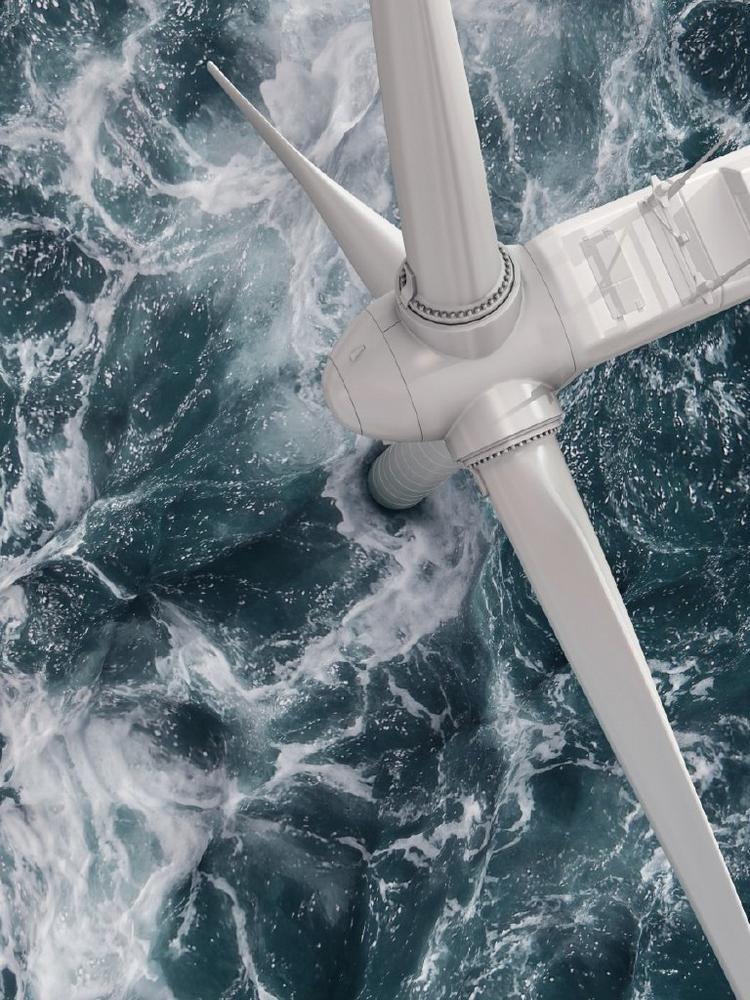A major challenge here is decentralized electricity storage to compensate for fluctuations in the generation of wind and solar energy. Plastics will play a central role in all these issues in the future – from power generation and storage to use in vehicles and at home. Covestro will be showcasing a full range of innovative and more sustainable material solutions at the K 2022 trade fair in Düsseldorf, Germany, from October 19 to 26.
Renewable energy on the rise
Take wind power, for example: an innovative polyurethane (PU) resin enables more efficient and cost-effective production of robust rotor blades. Covestro is working with key industrial partners to roll out this new resin technology for blade composites. The product portfolio also includes PU elastomers for offshore wind farms, which ensure kink-protected power cables and thus smooth transmission of electricity to the mainland.
Covestro is also gradually converting its global production to energy supply with green electricity. To this end, the company has signed supply agreements with European suppliers Ørsted to supply its German sites and with ENGIE for its production in Antwerp, Belgium; in both cases, the electricity comes from wind power. In Germany, Covestro has also contractually secured a long-term supply of solar power – 63 megawatts of capacity – from the country’s largest solar park operated by energy company EnBW in Brandenburg. In China, Covestro also purchases solar power from the local supplier Datang Wuzhong New Energy Co. Further supply contracts for electricity from renewable sources are planned.
Energy storage challenge
The switch to renewable energy will create a major need for additional energy storage worldwide in the long term. Various storage solutions are being developed for electricity from renewable sources front-of-the-meter – immediately after generation – and behind-the-meter – before use in vehicles, buildings and industry. They will become part of a new infrastructure that includes, in large part, batteries and controllers for electric vehicles, but also stationary solutions such as charging stations and wallboxes, as well as batteries for domestic power supply.
The design of the battery in particular – the heart of the electric car – places great demands on the properties of the plastics used, especially since many cell holders have to be very well fixed in a confined space to ensure maximum range and safety of the vehicle. Covestro has developed a concept for this based on lightweight and robust polycarbonates and their blends, which also includes the production of modules, housing parts and crash absorbers for the batteries, as well as control units in the electric powertrain of the vehicle. The plastics are dimensionally stable, electrically insulating and offer a great deal of design freedom, while complying with the required high safety standards demanded by the industry and environmental guidances.
These properties of polycarbonate plastics are also beneficial in their application in charging stations, wallboxes and battery home storage systems. Covestro supports customers from material selection to component design and CAE-based simulation calculations, as well as mold flow analysis and injection molding.
On the way to a circular economy
For the applications mentioned above, Covestro now also offers polycarbonates that are climate-neutral from cradle to factory gate1. They are produced using ISCC PLUS certified raw materials from mass-balanced biowaste and residual materials and using renewable energy. As a result, they have the potential to reduce the carbon footprint to zero.
Post-industrial waste from polycarbonates and their blends can be reused, reprocessed or recycled just like plastics after their useful life (post-consumer). To close the loop, systems for collecting, sorting and processing plastic waste, among other things, still need to be established.
Covestro has also created a much more sustainable basis for the production of two important polyurethane raw materials, the so-called isocyanates TDI and MDI, by using alternative raw materials. While the renewable TDI is based on mass-balanced and ISCC PLUS-certified precursors from biowaste and residual materials, MDI is also offered as a climate-neutral product from cradle to factory gate1.
1 Cradle-to-Gate is an assessment of a partial product life cycle from resource extraction (cradle) to the factory gate of Covestro. It is based on Covestro’s internal calculations and was critically reviewed for plausibility by TÜV Rheinland.
Covestro is one of the world’s leading manufacturers of high-quality polymer materials and their components. With its innovative products, processes and methods, the company helps enhance sustainability and the quality of life in many areas. Covestro supplies customers around the world in key industries such as mobility, building and living, as well as the electrical and electronics sector. In addition, polymers from Covestro are also used in sectors such as sports and leisure, cosmetics and health, as well as in the chemical industry itself.
The company is committed to becoming fully circular and is striving to become climate neutral by 2035 (scope 1 and 2). Covestro generated sales of EUR 15.9 billion in fiscal 2021. At the end of 2021, the company had 50 production sites worldwide and employed approximately 17,900 people (calculated as full-time equivalents).
Covestro AG
Friedrich-Ebert-Straße 350
51373 Leverkusen
Telefon: +49 (214) 60092000
http://www.covestro.com/
Externe Kommunikation / Fachpresse
Telefon: +49 (214) 30-25363
Fax: +49 (214) 30-66426
E-Mail: Frank.Rothbarth@covestro.com
![]()

